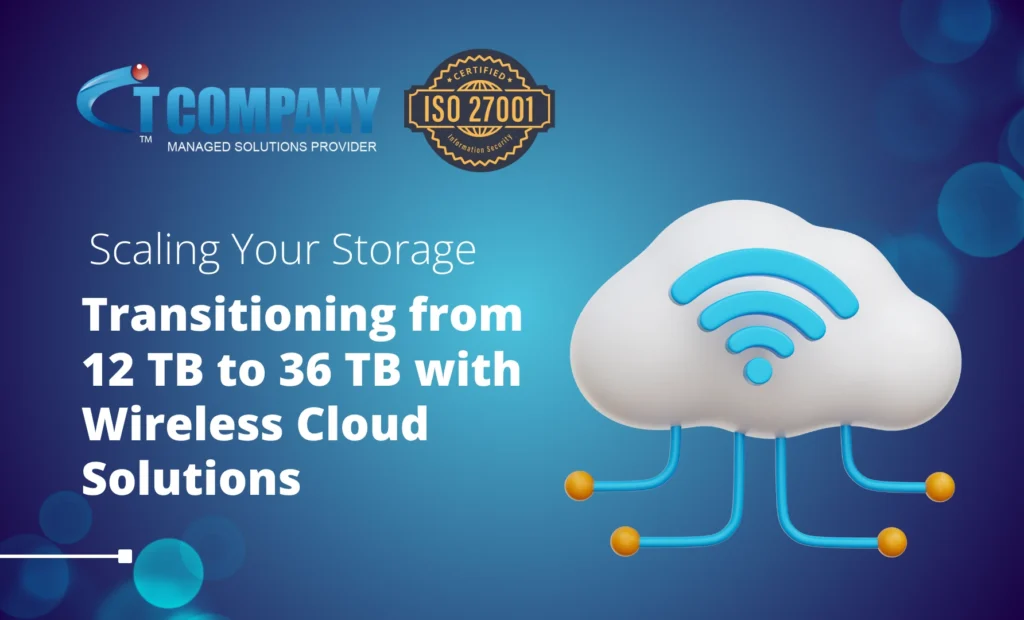
Table of Contents
Toggle.
12TB storage to 36TB storage wireless connected cloud solution is a seamless process. Not only it expands your data capacity without the hassle of using physical devices. As your digital needs grow, scaling up storage becomes of utmost importance.
Wireless cloud storage allows you to manage and access files quickly, ensuring extra space for photos, videos, and documents. Guess what? It all comes with the convenience of online access from anywhere and anytime.
What is Cloud Storage?
Before we start, let’s first understand what cloud storage is. Think of it as a storage space on the internet. Instead of keeping all your files in your computer or a hard drive at home, you can store them in a “cloud.” The cloud is a safe place on the internet where you can keep all your important files. You can access these files anytime and from anywhere, as long as you have an internet connection.
What Does 12TB and 36TB Mean?
When we say 12TB (Terabytes) or 36TB, we are talking about how much space you have to store your data. 1TB equals 1,000 gigabytes (GB), which is a lot of space for most things like photos, videos, and documents.
- 12TB is like a storage box that can hold 12,000 gigabytes of data.
- 36TB is three times bigger, holding 36,000 gigabytes.
So, if you are running out of space with 12TB, you might need to upgrade to 36TB.
Why Do You Need More Storage?
There are many reasons why you might need more storage. If you are a business owner, a photographer, or someone who stores a lot of videos and pictures, your data grows quickly. For example, if you take a lot of high-definition photos or videos, each file can be large, and soon you may run out of space.
When your storage box (or hard drive) fills up, you have two choices:
- Delete some old files.
- Get more space.
Since deleting files might not be an option, expanding your storage is the best solution. This is where wireless cloud solutions come in.
Why Choose Wireless Cloud Storage?
There are many reasons why wireless cloud storage is a great option:
- No Wires: Wireless means you don’t have to worry about connecting any cables or external hard drives to your computer. You can upload and download files with just an internet connection.
- Access Anywhere: With cloud storage, you can access your files from anywhere, whether you’re at home, at work, or even on vacation.
- Security: Cloud storage is secure. Companies that offer cloud storage use strong security systems to protect your data from hackers.
- Easy Expansion: You can add more space anytime. If you start with 12TB and later need 36TB, you can easily upgrade without buying new hardware.
How to Transition from 12TB to 36TB
Let’s look at how to move from a 12TB storage solution to a 36TB solution using wireless cloud storage. The process is simple, and you can follow these steps:
Step 1: Choose a Cloud Storage Provider
There are many companies that offer cloud storage services. Some popular ones include:
- Google Drive
- Dropbox
- Amazon Web Services (AWS)
- Microsoft OneDrive
- iDrive
Each of these providers has different plans for storage. Some offer 12TB plans, while others may offer even more storage. Make sure you choose a provider that meets your needs.
Step 2: Understand Your Current Usage
Before upgrading, it’s important to understand how much storage you are currently using. You need to know how much space you’re using right now and how much more space you will need in the future.
Here’s a simple table to help you visualize the storage:
| Type of File | Average Size | Storage Used |
|---|---|---|
| Photo (High-Res) | 5 MB | 1,000 photos |
| Video (HD) | 500 MB | 20 videos |
| Document (PDF) | 2 MB | 500 documents |
In this table, you can see how much space different types of files take up. If you store a lot of high-resolution photos or videos, you will need more storage space.
Step 3: Plan Your Storage Needs
If you are using 12TB of space and need 36TB, think about the future. Will you continue to add more photos, videos, or documents? If yes, then it’s a good idea to choose a 36TB plan. This way, you won’t run out of space soon.
You can choose a plan that gives you more space than you need now, so you don’t have to worry about upgrading again for a while.
Step 4: Migrate Your Files
Once you’ve chosen your cloud storage provider and plan, the next step is to move your files to the cloud. This process is called “migration.” You can upload files from your computer, external hard drives, or other storage devices to the cloud. Most cloud services make this process easy with special apps or websites.
Benefits of Cloud Storage
Here are some benefits of using cloud storage to scale your storage:
- No Physical Space Needed: You won’t need big storage devices like external hard drives. All your data is stored online.
- Backup: Your files are automatically backed up, so if something happens to your computer or hard drive, your files are still safe in the cloud.
- Collaboration: You can share files with others easily. For example, if you’re working on a project with friends or coworkers, you can share files in the cloud, and everyone can access them in real-time.
- Automatic Updates: Many cloud storage services automatically update your files, so you don’t have to worry about losing the latest version.
How to Manage Your 36TB Storage
Once you have 36TB of storage, it’s important to keep it organized. Here are a few tips to help you manage it:
- Create Folders: Organize your files into folders based on categories (e.g., Work, Family, Photos, Videos).
- Use Tags: Some cloud storage providers allow you to tag files, making it easier to search for them later.
- Regular Backup: Even though your files are stored in the cloud, it’s still a good idea to backup files to an external drive occasionally.

Conclusion
Upgrading your storage from 12TB storage to 36TB storage wireless connected cloud solutions is a smart choice. It gives you more space, flexibility, and easy access to your files anytime, anywhere. Whether you’re storing personal photos, work files, or important documents, cloud storage is the perfect way to manage your data.
So, if you find that your storage box is full, don’t panic. With a wireless cloud solution, scaling up is easy. Just choose a provider, plan your needs, and migrate your files to the cloud. You’ll have plenty of room for all your data, and you’ll never run out of space again!




